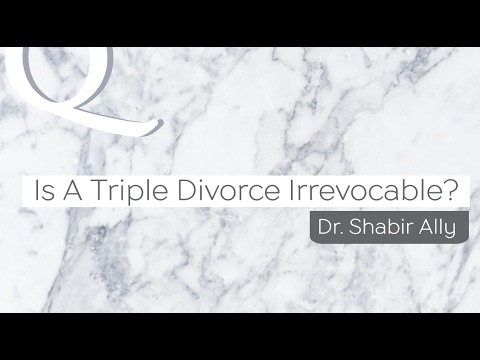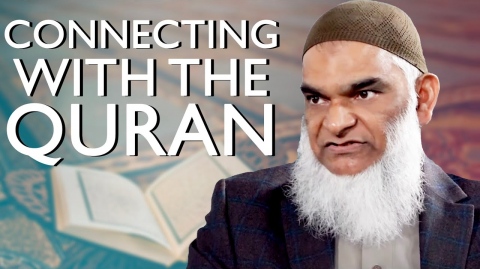Dr. Shabir Ally cites Ian Mevorach's article : Did Jesus Predict Muhammad?
9 years ago
07:15
2,069 views
Dr. Shabir Ally cites Ian Mevorach's article : Did Jesus Predict Muhammad? A Biblical Portal Between Christianity and Islam
---------------------------------------------------
Did Jesus Predict Muhammad? A Biblical Portal Between Christianity and Islam by Ian Mevorach
The time has come for Christians and Muslims to make peace between our communities. Christians and Muslims already make up more than half of the global population, and these numbers are expected to grow in the coming decades; according to the Pew Research Center, by 2050, two thirds of humanity, some 5.7 billion people, will be either Christian or Muslim.
Our planet simply cannot afford another century of misunderstanding and violence between these two communities. The challenges we face as a global human family are profound: ongoing warfare and nuclear proliferation, global poverty and economic inequality, climate change and ecological degradation. How will humanity handle these crises and others if our two largest religious communities are embroiled in constant conflict, if misunderstanding defines our relationship? As contemporary theologian Hans Kung has argued for decades, there will be no peace between our nations without peace between our religions. Now is the time to transform the way Christians and Muslims see and relate to each other.
In an earlier blog on the Huffington Post about the problem of Christian Islamophobia, I argue that Christians have the opportunity to transform the way we see Islam and Muslims by accepting Muhammad as “Spirit of Truth.”
Historically, most Christian theologians—including John of Damascus, Thomas Aquinas, Dante, Nicholas of Cusa, and Martin Luther—have seen Muhammad not as a “Spirit of Truth” but as a “Spirit of Error,” a false prophet or heretic. There are many Christians today who respect the Islamic tradition and would never make such an offensive statement about Muhammad.
However, the majority of Christians still maintain a fundamentally Islamophobic position on Muhammad. So I believe that the time has come for peacemaking Christians to contradict this position directly. Changing our view of Muhammad—so that we recognize him as a true prophet rather than discredit him as a false prophet—would effectively inoculate Christians against Islamophobia and would help to establish a new paradigm of cooperative Christian-Muslim relations.
In Jesus’ farewell discourse in the Gospel of John (chapters 14 to 16), Jesus speaks about the coming of the “Spirit of Truth” or “Advocate” (in Greek, parakletos). For centuries Muslim interpreters have seen Muhammad as this “Advocate,” based on Qur’an 61:6, a verse in which Jesus predicts the coming of a future prophet named Ahmad: “O Children of Israel! Truly I am the Messenger of God unto you, confirming that which came before me in the Torah and bearing glad tidings of a Messenger to come after me whose name is Ahmad” (61:6, The Study Quran). Ahmad, which is another name for Muhammad, is very close etymologically to the Greek word, parakletos, so it is likely that the Qur’an is claiming that Jesus’ farewell discourse in the Gospel of John predicts Muhammad. The major objection to applying these predictions to Muhammad or any other prophet is that Christians normally read them as part and parcel of Jesus’ promise of the gift of the Holy Spirit.
http://www.huffingtonpost.com/ian-mevorach/did-jesus-predict-muhammad_b_9762934.html
---------------------------------------------------
Did Jesus Predict Muhammad? A Biblical Portal Between Christianity and Islam by Ian Mevorach
The time has come for Christians and Muslims to make peace between our communities. Christians and Muslims already make up more than half of the global population, and these numbers are expected to grow in the coming decades; according to the Pew Research Center, by 2050, two thirds of humanity, some 5.7 billion people, will be either Christian or Muslim.
Our planet simply cannot afford another century of misunderstanding and violence between these two communities. The challenges we face as a global human family are profound: ongoing warfare and nuclear proliferation, global poverty and economic inequality, climate change and ecological degradation. How will humanity handle these crises and others if our two largest religious communities are embroiled in constant conflict, if misunderstanding defines our relationship? As contemporary theologian Hans Kung has argued for decades, there will be no peace between our nations without peace between our religions. Now is the time to transform the way Christians and Muslims see and relate to each other.
In an earlier blog on the Huffington Post about the problem of Christian Islamophobia, I argue that Christians have the opportunity to transform the way we see Islam and Muslims by accepting Muhammad as “Spirit of Truth.”
Historically, most Christian theologians—including John of Damascus, Thomas Aquinas, Dante, Nicholas of Cusa, and Martin Luther—have seen Muhammad not as a “Spirit of Truth” but as a “Spirit of Error,” a false prophet or heretic. There are many Christians today who respect the Islamic tradition and would never make such an offensive statement about Muhammad.
However, the majority of Christians still maintain a fundamentally Islamophobic position on Muhammad. So I believe that the time has come for peacemaking Christians to contradict this position directly. Changing our view of Muhammad—so that we recognize him as a true prophet rather than discredit him as a false prophet—would effectively inoculate Christians against Islamophobia and would help to establish a new paradigm of cooperative Christian-Muslim relations.
In Jesus’ farewell discourse in the Gospel of John (chapters 14 to 16), Jesus speaks about the coming of the “Spirit of Truth” or “Advocate” (in Greek, parakletos). For centuries Muslim interpreters have seen Muhammad as this “Advocate,” based on Qur’an 61:6, a verse in which Jesus predicts the coming of a future prophet named Ahmad: “O Children of Israel! Truly I am the Messenger of God unto you, confirming that which came before me in the Torah and bearing glad tidings of a Messenger to come after me whose name is Ahmad” (61:6, The Study Quran). Ahmad, which is another name for Muhammad, is very close etymologically to the Greek word, parakletos, so it is likely that the Qur’an is claiming that Jesus’ farewell discourse in the Gospel of John predicts Muhammad. The major objection to applying these predictions to Muhammad or any other prophet is that Christians normally read them as part and parcel of Jesus’ promise of the gift of the Holy Spirit.
http://www.huffingtonpost.com/ian-mevorach/did-jesus-predict-muhammad_b_9762934.html


 English
English Български
Български No filter
No filter











